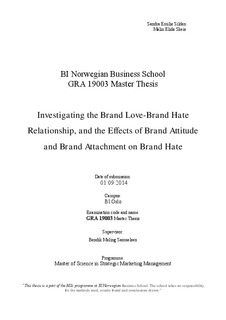Investigating the brand love-brand hate relationship, and the effects of brand attitude and brand attachment on brand hate
Master thesis
Permanent lenke
http://hdl.handle.net/11250/295668Utgivelsesdato
2015-08-07Metadata
Vis full innførselSamlinger
- Master of Science [1621]
Sammendrag
There has been an increase in consumer research on consumer-brand relationships, specifically positive relationship between the consumer and brands. This thesis tries to shed light on a topic that has received less attention, though highly related, namely brand hate. Study 1 was conducted in order to investigate an antecedent to brand hate, building on the fact that love for a competing brand can cause brand hate. To our knowledge this topic has not been examined before. However, a line of research indicates that such relationships exists between brand hate and brand love. This relationship is very apparent in the sports industry, just imagine the rivalry between competing football teams. We believe that such relationships are mirrored in other categories as well, even though not as evident. Results from study 1 confirm this relationship in some of the investigated categories. Specifically, we get support for the hypothesis in product categories with high signaling value. Further, we get a surprising result showing that when hate (love) for one brand increases, so does hate (love) for the competing brand in that category. Study 2 was conducted to examine how consumers with love for a brand with high signaling value would react to positive information about a direct and an indirect competitor. Previous research indicates that when given positive information about a direct competitor, feelings of love, liking and attachment will increase, while positive information about an indirect competitor will have no effect on previous attitudes and attachment. Results from study 2 support our hypotheses to some degree. Positive information concerning the direct competitor showed significant results for brand attachment, but not for brand love and brand liking. Positive information concerning the indirect competitor showed no significant change across the three items, as expected. Findings from the current research contribute to literature by suggesting an antecedent of brand hate. Investigating further, results indicate that there are differences between categories with high badge value and those with lower badge value. In addition, our results confirm previous theory on the difference between brand attitudes and brand attachment.
Beskrivelse
Masteroppgave(MSc) in Master of Science in Strategic Marketing Management - Handelshøyskolen BI, 2015
Beslektede innførsler
Viser innførsler beslektet ved tittel, forfatter og emneord.
-
Country-of-origin and brand reputation effects on brand equity. Can a strong brand name strengthen or reverse country-of-origin effects on brand equity?
Sanfilippo, Marie (Master thesis, 2017)The concept of country-of-origin has been extensively studied with the apparition of multinational companies separating and outsourcing their operations worldwide. It has been established that country-of-origin has an ... -
Employer Branding and its Impact on Brand Equity : A study examining the influence that different employer branding initiatives have on brand preferences among consumers and employees
Hafskjold, Jenny Hanche; Halle, Felix Alexander Smith (Master thesis, 2022)For most firms the main objectives are to generate sales and profit. However, behind the bases of generating sales and profits, there are a bunch of strategic issues firms need to overcome when achieving success with its ... -
Cross-gender Brand Extensions: How will gender of brand, gender of consumer and extension category influence the evaluation of a cross-gender brand extension?
Schartum, Christian; Rikardsen, Emil Kristian Meland (Master thesis, 2019)Cross-gender brand extension has become a valuable strategy in recent years and grown to be an important component of strategic marketing communication. Previous research has touched upon the topic, however, as far we ...
